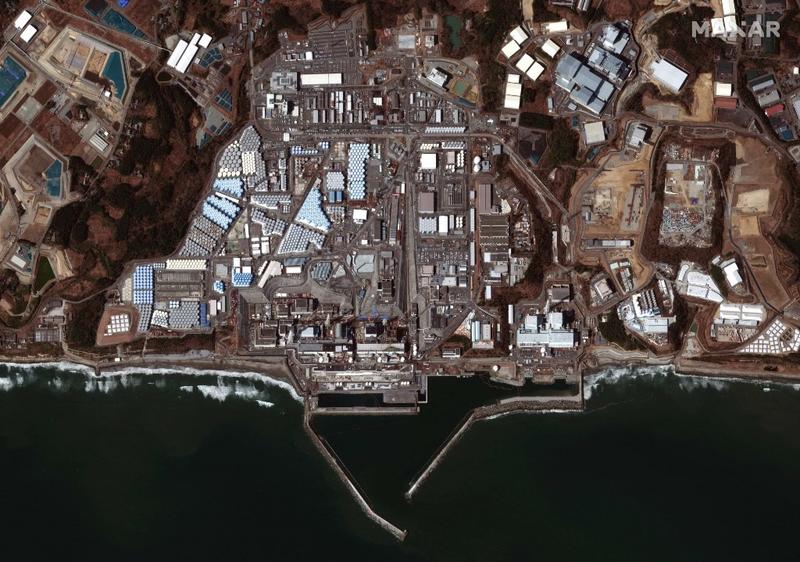 This handout satellite image released by Maxar Technologies on March 10, 2021, shows the Tokyo Electric Power Company Holdings (TEPCO) Fukushima Daiichi nuclear power plant at Okuma, Fukushima prefecture, on Feb 28, 2011, nearly 10 years after an earthquake and tsunami hit the area causing a nuclear disaster. (HANDOUT / SATELLITE IMAGE ©2021 MAXAR TECHNOLOGIES / AFP)
This handout satellite image released by Maxar Technologies on March 10, 2021, shows the Tokyo Electric Power Company Holdings (TEPCO) Fukushima Daiichi nuclear power plant at Okuma, Fukushima prefecture, on Feb 28, 2011, nearly 10 years after an earthquake and tsunami hit the area causing a nuclear disaster. (HANDOUT / SATELLITE IMAGE ©2021 MAXAR TECHNOLOGIES / AFP)
TOKYO - Japan's industry minister Koichi Hagiuda vowed to promote the decommissioning of the crippled Fukushima nuclear plant and recovery of the area as a top priority during his first visit Sunday to the northeastern Japan prefecture since assuming office, local media reported Monday.
China has expressed serious concerns about Japan's decision to discharge contaminated water from the Fukushima nuclear station
Meanwhile, Hagiuda told Fukushima Governor Masao Uchibori and the mayors of municipalities hosting the Fukushima Daiichi nuclear power plant that his ministry would put full efforts to deal with the release of treated radioactive water from the facility damaged by a massive earthquake and tsunami in March 2011.
In the meeting, Uchibori requested the central government to handle issues such as the lifting of an evacuation order for residents near the damaged power plant. Futaba Mayor Shiro Izawa and Okuma Mayor Jun Yoshida together asked the state to take effective measures against the reputational damage associated with the controversial plan of discharging treated water.
In addition, the mayors also warned Tokyo Electric Power Co, Ltd (TEPCO), the operator of the plant, not to sloppily manage radioactive waste from power facilities.
"The state, instead of TEPCO, will lead the decommissioning of (Fukushima Daiichi) reactors," Hagiuda told reporters after the meetings.
ALSO READ: IAEA experts to review Fukushima water release plan
Japan is planning to begin discharging the water into the sea from around the spring of 2023, stating that water pumped into the ruined reactors at the Fukushima plant to cool the melted fuel is treated using an advanced liquid processing system, which could limit tritium to a low level in the water.
However, the decision has received strong criticism from neighboring countries.
China has expressed serious concerns about Japan's decision to discharge contaminated water from the Fukushima nuclear station, with Foreign Ministry spokesperson Zhao Lijian saying that China urged the Japanese side to take a responsible attitude and treat the issue of nuclear waste disposal with caution.
Meanwhile, South Korea has also voiced its "grave concerns," with Foreign Ministry spokesman Choi Young-sam saying "it will be difficult to accept if the Japanese side decides to release the contaminated water from the Fukushima nuclear power plant without sufficient consultations."
Local fishermen remain opposed to the planned discharge of treated water because it could destroy the reputation of Fukushima seafood.
TEPCO Chairman Yoshimitsu Kobayashi, who accompanied Hagiuda on his tour of the power plant, met with Uchibori on Monday. Kobayashi told reporters after the meeting that he would hold further dialogue with locals to try to make them understand what he called the "safety steps."


